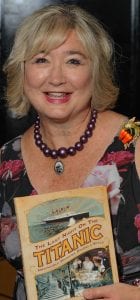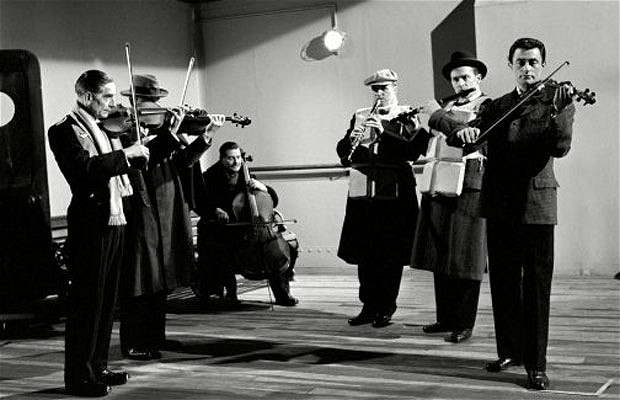The musicians of the Titanic famously continued playing as the ship went down, a testimony to practicing one’s craft until their dying breath. But did it really happen like this?
Varying accounts exist as to whether the band played until the end and also about what the band was playing. We will explore the accounts in this episode.
Nine weeks after the sinking, second class passenger Lawrence Beesley published his account of that last night aboard the Titanic. It was titled The Loss of the S.S. Titanic. Beesley recalled: “Many brave things were done that night, but none were more brave than those done by men playing minute after minute as the ship settled quietly lower and lower in the sea. The music they played served alike as their own immortal requiem and their right to be recalled on the scrolls of undying fame.”
Edith Rosenbaum Russell was outspoken in her contention that the ship’s band did not play “Nearer My God to Thee,” and that it did not continue playing as the Titanic sank. “When people say music played as the ship went down, that is a ghastly, horrible lie,” she told the BBC.
Third class passenger Gherson Coen agreed that the band did not play as the ship went down. He said he heard the band playing when the boat struck the iceberg, when he was trying to get on deck, but when he decided to jump, he saw the musicians standing back, holding their instruments.
Other survivors told a different story. Colonel Archibald Gracie said he heard a cheerful tune he couldn’t recognize. He said he surely would have recognized “Nearer My God to Thee.” “I assuredly should have noticed it and regarded it as a tactless warning of immediate death to us all and one likely to create panic,” he said. Some recalled that shortly after 1:00 a.m., the band, each member now secured in his life vest, switched from the ragtime tunes they had been playing to an Episcopal hymn, “Autumn.”
Dr. Henry Washington Dodge said that when the boats were leaving, the ship rockets were going up from the Titanic and the orchestra was playing “Lead, Kindly Light.” First class steward Edward Brown survived the sinking and told investigators that he didn’t recall hearing the band stop playing. Steward Brown said he heard them playing for a long time on the boat deck, between the first and second funnels. And he still heard them playing as he and others struggled to get a collapsible lifeboat off the top of the roof of the officers quarters. The last night of the Titanic was the first time Steward Brown ever swam. Some recalled hearing “Aughton,” also known as “He Leadeth Me,” which was written by Joseph Gilmore of the First Baptist Church of Philadelphia in 1859.
Eva Hart said there is no doubt that the band was playing. She insisted she heard them play “Nearer My God to Thee.” Marion Wright, also in second class, said that from the lifeboat she could hear the Titanic’s band playing “Nearer My God to Thee” as the great ship slipped completely under.
The band was an essential part of life aboard the Titanic:
As Collier’s Weekly reported on May 4, 1912, first class passenger Helen Churchill Candee recalled that “after dinner, there was coffee served to all at little tables around the great general lounging place, for here the orchestra played. Some said it was poor on its Wagner work; others said the violin was weak. But that was for conversation’s sake, for nothing on board was more popular than the orchestra.”
On April 14 after the Titanic struck the iceberg: “We’re just going to play a tune to cheer things up a bit,” John “Jock” Law Hume, the first violinist on the Titanic, told his friend, stewardess Violet Jessop when they bumped into each other in the scurry to get to the upper deck after the ship hit the iceberg.
Jock and Violet had become friends while working together through the years, including on the Olympic. Violet became widely known as possibly the only person to have survived three sinkings aboard three sister ships: the Titanic, the Britannic, and the Olympic.
Culinary Spotlight: The Robert Burns Cocktail – because Scottish Poet Robert Burns was from Dumfries, Scotland – which is where Titanic first violinist John “Jock” Hume was from
Robert Burns (with Bénédictine)
2 oz. Spencerfield Spirit Sheep Dip or Johnnie Walker Black blended Scotch whiskey 1 oz. Cinzano Rosso sweet vermouth ¼ oz. Bénédictine liqueur 2 dashes Emile Pernot Vieux Pontarlier absinthe
Add all ingredients to mixing glass. Add ice and stir for thirty seconds. Strain into chilled cocktail glass. Garnish with lemon twist. Serve with three small shortbread bookies on side plate.
—Frank Caiafa, The Waldorf Astoria Bar Book
The Robert Burns
2 oz. blended Scotch whiskey 1 oz. vermouth 2 dashes absinthe 1 dash Regans’ Orange Bitters No. 6 lemon twist, for garnish shortbread cookie on side
Combine whiskey, vermouth, absinthe, and bitters into a cocktail shaker filled with ice and stir for thirty seconds. Strain mixture into a chilled martini glass.
—Frank Caiafa, The Waldorf Astoria Bar Book
Short Bread Cookie (for the Robert Burns “garnish”)
Makes 7 dozen cookies. 1 lb. butter 10 Tablespoons sugar 2 Tablespoons water 4 teaspoons vanilla 4 cups flour 1 teaspoon salt 2 cups ground pecans (optional) 4 cups powdered sugar (optional) Using a hand-held mixer, cream together butter, sugar, water, and vanilla, gradually adding in flour and salt. Cream until mixture is fluffy and light. Add vanilla and water. Add pecans if desired. Mix together well. Roll cookie dough in your hands into 1-inch balls. Place balls evenly apart on buttered cookie sheet. Use the palm of your hand to press down each ball. Bake in 325 degree oven for twenty minutes. When cool, place powdered sugar on a plate and coat each cookie in powdered sugar.
—Jeanne Kroeplin
About the Producers of the Series
 Veronica Hinke is an expert in Food History & Culinary Narrative. She is the author of the acclaimed historical novel “The Last Night on the Titanic: Unsinkable Drinking, Dining & Style).” Veronica is passionate about sharing her love of history, culinary arts and most of all…. people. “Every food story I’ve ever written, always, at the core of each one, ended up being about the people, and that doesn’t seem to change. My book, “The Last Night on The Titanic,” is no different. Those stories of hope and resilience…I think that’s why the Titanic story is still alive today.”
Veronica Hinke is an expert in Food History & Culinary Narrative. She is the author of the acclaimed historical novel “The Last Night on the Titanic: Unsinkable Drinking, Dining & Style).” Veronica is passionate about sharing her love of history, culinary arts and most of all…. people. “Every food story I’ve ever written, always, at the core of each one, ended up being about the people, and that doesn’t seem to change. My book, “The Last Night on The Titanic,” is no different. Those stories of hope and resilience…I think that’s why the Titanic story is still alive today.”
Veronica’s mouthwatering books, short stories and magazine articles explore food history and the delicious culinary narratives that take you back in time. My heart calling is writing, teaching and speaking about the art of storytelling.
Scott Michael Rank, Ph.D., is the editor of History on the Net and host of the History Unplugged podcast. A historian of the Ottoman Empire and modern Turkey, he is a publisher of popular history, a podcaster, and online course creator.
Cite This Article
"Last Night on the Titanic: The Musicians" History on the Net© 2000-2024, Salem Media.
May 8, 2024 <https://www.historyonthenet.com/last-night-titanic-musicians>
More Citation Information.






